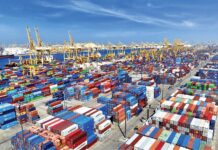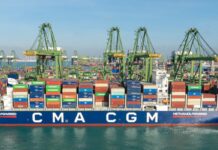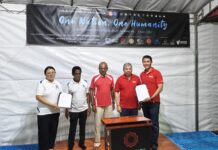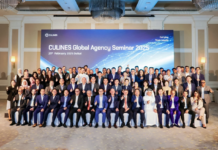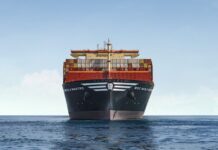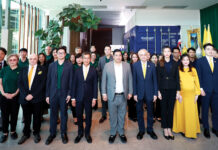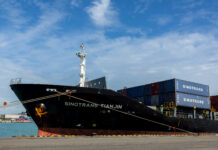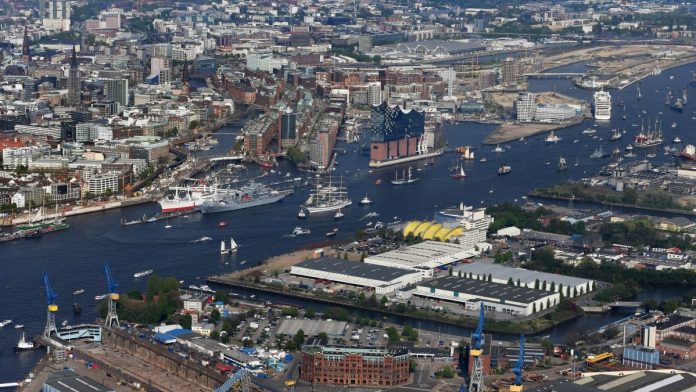
Passion is the driving force behind all successes in life; it’s what keeps a person moving forward in an attempt to reach their dreams. This same passion in sea freight, engines, technology and innovations is enabling one Thai woman to overcome any obstacle and to take on more challenges which has allowed her the opportunity to work with Hamburg Port Authority.
To learn more, we sat down with Dr. Phanthian Zuesongdham (Oen) to find out about her inspirations and experiences that made her decide to work in the logistics industry, and her view on working in one of the fastest growing ports in the world as the head of Digital & Business Transformation team and head of Programme Management of Hamburg’s smartPORT initiative.
Making Dreams Comes True
Dr. Phanthian’s love for logistics was a big motivator for her to pursue this career path. She said that when she was young, she had a chance to go on a sightseeing tour onboard a container vessel. Dr. Phanthian says she loves everything related to engines and mechanics, and she took in all the operations happening on the vessel and you could say it was love at first sight. After that unforgettable experience it lit a spark in her and she decided her dream was to become a sea captain.

However, at that time, women couldn’t access most of the maritime schools in Thailand, so the dream was short-lived. Because of this, she made the decision to attend the Faculty of Business Administration at Thammasat University with a major in International Transport Management and Marketing to get ready to clear the path to her dream job in the logistics industry instead. Moreover, she also worked as a volunteer at UNESCAP (United Nations Economic and Social Commission for Asia and Pacific) and was awarded internships at Lufthansa Cargo, Germany’s biggest cargo airline and a leading global logistics provider. This was the foot in the door moment where she was able to gain many useful skills in the shipping and logistics industry.
After graduating from Thammasat University, she continued to work with Lufthansa Cargo for two and a half years. Seizing the opportunity at hand, she continued studying towards her Master of Business Administration in the field of Logistics and Risk Management at University of Hamburg, Germany. After attaining that, she continued studying to attain her Doctoral degree in Maritime Logistics, Process Management, Transport Management, Project Cargo at Hamburg University of Technology. During this time, she worked for BP, British multinational oil and gas company, and worked as research associate for logistics and maritime management. She continued working with BP until she had a chance to work with the Hamburg Port Authority, which is a public service institution responsible for development and maintenance of the port infrastructure along with traffic management of all types of transportation at the port.
Dr. Phanthian has worked at the Hamburg Port Authority for almost 9 years already. She currently plays a vital role in the digital operations projects and continues to improve the port of Hamburg’s performance with an eye towards future demands and with the goal of maintaining the Port’s leading position in Germany and Europe.
Dr. Phanthian said, “I am currently responsible for state-of-the-art digital and process strategy including developing an organizational culture to enhance the Port’s efficiency to meet growing international and domestic demands. We are exploring new technologies now such as 3D models known as “digital twin technology.” Moreover, we are also exploring Virtual Reality (VR), Augmented Reality (AR) as well as IoT (Internet of Things) technology that can be used as a pillar for our infrastructure in order to create the safest and most efficient port possible.”
Smart Port
In addition to being responsible for digital management at the Port, Dr. Phanthian is also responsible for Port of Hamburg’s smartPORT initiative which aims to develop intelligent solutions for their operation.
Port of Hamburg is the biggest port in Germany and is located in the middle of Hamburg which is the second-largest city in Germany with a storied history spanning more than 800 years. The Port has become intertwined with the city, and many associate Hamburg with the Port. Because of this, the Hamburg Port Authority aims to improve the operational efficiency at the Port, not only for better customer experiences but also the people of Hamburg’s overall quality of life.

For those reasons, the smartPORT initiative looks to combine economic and ecological aspects with new technology to improve the port’s efficiency known as smartPORT energy and smartPORT logistics.
SmartPORT energy is a strategy that features environmentally-friendly initiatives to reduce environmental impact, energy and save on costs. SmartPORT logistics looks to optimize supply chain and transportation networks. Its focus is on optimization of the flow of intermodal traffic, infrastructure and goods traffic in the port.
“There are many ports in Europe with poor operations and management. Most of them are situated in the rural areas, where people are not living. But here, everything that we do impacts the city directly as we call ourselves as a city port. Because the city and the port can’t be separated, the impact will always be felt more readily. The efficiency of the port has a deep impact on the city and people if we’re not doing things right. So, everything we do from a strategic point of view on the policy or our master plan of the infrastructure and the traffic management we have must take into concern the residents nearby as a top priority. We have to realize that what we do in the port is always been observed, from both an ecological and economic point of view,” said Dr. Phanthian.
Besides the effort and commitment to improving operational excellence by developing infrastructure to meet the growing demand on mega vessels in Hamburg, the Port is adapting to a new role in the digital age from the continuing growth of e-Commerce platform providers such as Alibaba or Amazon. They are trying to expand their business by creating new services by the means of technology such as blockchain that is currently in the spotlight for the logistics industry.
Dr. Phanthian said, “Blockchain is actually not a very new technology. Blockchain was invented more than 30 years ago by the Japanese. Blockchain is more or less how you send and encrypt information in a block. So, it will not be changed anymore after you submit the information. That makes blockchain in many ways more secure compared to the current information sharing services that we use right now. I think that the development is coming really fast and we have to see closely how blockchain could change the logistics industry, because logistics is one of the industries which has many intermediary services. As we are already seeing development in markets around Europe and also around the world that some of the shipping lines like Maersk have joined IBM together with Port of Singapore to start their own blockchain prototype. They would like to explore what kind of new services that they can really make with their vertical integration, along with making the supply chain more efficient and more secure. That means our port has to get ready for every new technology trend in the world as well.”
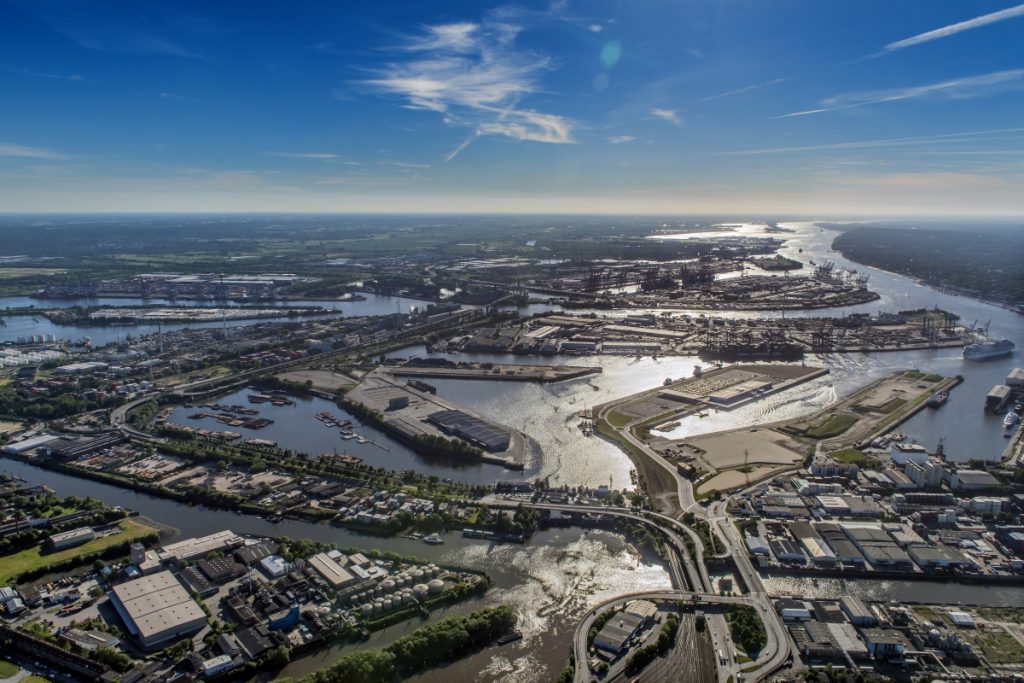
Open-mindedness is a key that Dr. Phanthian strives for and this personality helps her embrace different multiculturalism’s in the workplace. “When I came to Germany, there was a kind of stereotype that the Europeans are a lot better than Asians. For me, everyone has potential with different useful abilities no matter what skin color, race, religion or gender. I think we can learn from each other. And from my experience as working at Hamburg Port Authority, I could really say that German people have strong ambition and a very targeted orientation. Germans are a bit more intense then Thai’s, but on the other hand, Thai people have a service-oriented mindset and are also very flexible. Each have their pros and cons in different aspects. I think we have to pick what is best and try to adapt it for ourselves. One of the most important things for success is to know the strengths and weaknesses of yourself and your colleagues. Then apply our potential into our work to help each other develop more efficient performance. Most of all, we have to respect our colleagues no matter what,” added Dr. Phanthian.
อัพเดตข่าวสารและบทความที่น่าสนใจในอุตสาหกรรมโลจิสติกส์ก่อนใคร ผ่าน Line Official Account @Logistics Mananger เพียงเพิ่มเราเป็นเพื่อน @Logistics Manager หรือคลิกที่นี่


